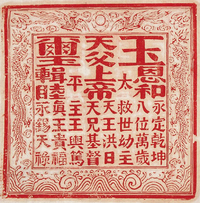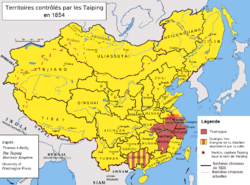Taiping Heavenly Kingdom
| The Heaven Kingdom of Eternal Peace | ||||||||||
|
太平天囯 Tàipíng Tiānguó |
||||||||||
|
||||||||||
|
||||||||||
|
Greatest extent (maroon) of the Taiping Heavenly Kingdom.
|
||||||||||
| Capital | Tianjing (天京) | |||||||||
| Languages | Chinese | |||||||||
| Religion |
Official: God Worshipping, Xiuquan's own diversification of Evangelical Christianity
Unofficial:
|
|||||||||
| Government | Heterodox Christian Theocracy & Absolute Monarchy | |||||||||
| Taiping Heavenly King (太平天王) | ||||||||||
| • | 1851–1864 | Hong Xiuquan | ||||||||
| • | 1864 | Hong Tianguifu | ||||||||
| Kings | Feng Yunshan (South King) | |||||||||
| Yang Xiuqing (East King) | ||||||||||
| Xiao Chaogui (West King) | ||||||||||
| Wei Changhui (North King) | ||||||||||
| Shi Dakai (Flank King) | ||||||||||
| Historical era | Qing dynasty | |||||||||
| • | Jintian Uprising | January 11, 1851 | ||||||||
| • | Capture of Nanking | March 1853 | ||||||||
| • | Tianjing Incident | 1856 | ||||||||
| • | Death of Hong Tianguifu | November 18, 1864 | ||||||||
| Currency | Holy Treasure (聖寶 shengbao) (cash) | |||||||||
|
||||||||||
| Today part of |
|
|||||||||
| Taiping Heavenly Kingdom | |||||||||||

Royal seal of the Taiping Heavenly Kingdom
|
|||||||||||
| Traditional Chinese | 1 | ||||||||||
|---|---|---|---|---|---|---|---|---|---|---|---|
| Simplified Chinese | |||||||||||
| Literal meaning |
Heavenly Kingdom of Great Peace Greatly Peaceful Heavenly Kingdom |
||||||||||
|
|||||||||||
| Transcriptions | |
|---|---|
| Standard Mandarin | |
| Hanyu Pinyin | Tàipíng Tiānguó |
| Wade–Giles | T‘ai-p‘ing T‘ien-kuo |
| Hong Kong Romanisation | Thai-phìn Thiên-koet |
The Taiping Heavenly Kingdom was an oppositional state in China from 1851 to 1864, supporting the overthrow of the Qing dynasty by Hong Xiuquan and his followers. The unsuccessful war it waged against the Qing is known as the Taiping Rebellion. Its capital was at Tianjing (present-day Nanjing).
A self-proclaimed convert to Christianity, Hong Xiuquan led an army that controlled significant part of southern China, with about 30 million people. The rebel kingdom announced social reforms and the replacement of Confucianism, Buddhism, and Chinese folk religion by his form of Christianity, holding that he was the second son of God and the younger brother of Jesus. The Taiping areas were besieged by Qing forces throughout most of the rebellion. The Qing government defeated the rebellion with the eventual aid of French and British forces.
In the mid-19th century, China under the Qing dynasty suffered a series of natural disasters, economic problems, and defeats at the hands of the Western powers—in particular, the humiliating defeat in 1842 by the British in the First Opium War. The war disrupted shipping patterns and threw many out of work. It was these disaffected who flocked to join the charismatic visionary Hong Xiuquan.
Beginning with Robert Morrison in 1807, Protestant missionaries began working from Macao, Pazhou (known at the time as "Whampoa"), and Guangzhou ("Canton"). Their household staff and the printers they employed for Morrison's dictionary and translation of the Bible—men like Cai Gao, Liang Afa, and Qu Ya'ang—were their first converts and suffered greatly, being repeatedly arrested, fined, and driven into exile at Malacca. However, they corrected and adapted the missionaries' message to reach the Chinese, printing thousands of tracts of their own devising. Unlike the westerners, they were able to travel through the interior of the country and began to particularly frequent the prefectural and provincial examinations, where local scholars competed for the chance to rise to power in the imperial civil service. One of the native tracts, Liang's nine-part, 500-page tome called Good Words to Admonish the Age, found its way into the hands of Hong Xiuquan in the mid-1830s, although it remains a matter of debate during which exact examination this occurred. Hong initially leafed through it with disinterest.
...
Wikipedia



